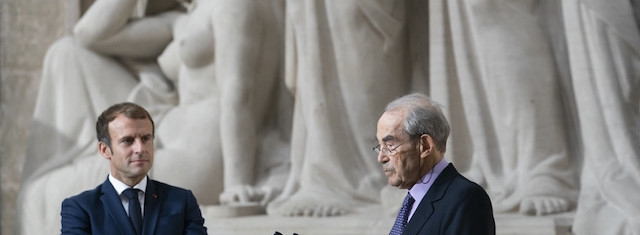News
PDT MACRON COMMEMORATES 40TH ABOLTION OF DEATH PENALTY IN PANTHEON
ALONGSIDE ROBERT BADINTER

Pdt Macron & Robert Badinter Pantheon (Source: Elysee Courtesy )
USPA NEWS -
On Saturday, October 9, President of the French Republic Emmanuel Macron commemorated the fortieth anniversary of the abolition of the death penalty, at the Pantheon, in the presence of Robert Badinter, lawyer, former Minister of Justice and former President of the Constitutional Council who had made adopt the law abolishing the death penalty in 1981.President Emmanuel Macron has announced that he wants to relaunch the fight for the universal abolition of the death penalty.
"Saturday, October 9 the President of the French Republic Emmanuel Macron commemorated the fortieth anniversary of the abolition of the death penalty, at the Pantheon, in the presence of Robert Badinter, lawyer, former Minister of Justice and former President of the Constitutional Council who had made adopt the law abolishing the death penalty in 1981. As part of the French presidency of the European Union, a meeting at the highest level bringing together civil societies from States still applying the death penalty will be organized in Paris , in order to convince their leaders of the importance and the urgency of abolishing it. France, with its partners in the European Union, will present to the next United Nations General Assembly a draft resolution so that each year, States that have not abolished the death penalty communicate to the United Nations, the number of sentences handed down and the number of executions carried out." Source: Elysee, French Presidency
CHRONOLOGY OF ABOLITION OF THE DEATH PENALTY IN FRANCE IN XX 1st CENTURY----------------------------
1906 The President of the Republic Armand Fallièees (1906-1913), a supporter of the abolition of the death penalty, systematically pardons all those condemned to death during the first two years of his term of office. The Budget Committee of the Chamber of Deputies votes to abolish the appropriations intended for the remuneration of the executioner and for the maintenance of the guillotine. In November, an abolitionist bill was tabled in the Chamber of Deputies by the Keeper of the Seals of the Clemenceau government, Guyot-Dessaigne. This bill is accompanied by two bills from Joseph Reinach and Paul Meunier, going in the same direction. They will not be discussed until 1908.-----------------------------------------------------------
1907 The "Soleilland affair" revives the debate on the death penalty in the press and public opinion. Accused of having raped and murdered the little girl of his neighbors, Soleilland was sentenced to death on July 24. On September 13, he was pardoned by the President of the Republic Armand Fallières. The Parisian press is following the affair with passion, especially since the abolitionist project has not yet been passed. The fiercely anti-abolitionist newspaper Le Petit Parisien is organizing a "referendum" on the death penalty in the fall, accompanied by a "competition". He published the results on November 5, 1907: out of 1,412,347 responses, 1,083,655 were in favor of maintaining the death penalty, 328,692 for its abolition.-------------------------------------------------------------------------------------------------------------------------------------------
1908 The Clemenceau government, whose new Keeper of the Seals is Aristide Briand, submits to deputies on July 3 the bill providing for the abolition of the death penalty. Despite the pleas of Aristide Briand and Jean Jaurès, during the debate which opposed them in particular to Maurice Barrès, the bill was rejected on December 8 by 330 votes to 201.
June 24, 1939A decree-law suppresses public executions. Executions will now take place inside prisons. Already raised on several occasions, the question of public executions resurfaced with the scandal of the execution on June 17, 1939 in Versailles of Eugen Weidmann, of German nationality. The hysteria of the crowd during the beheading and the behavior of the press throughout the affair prompted the government, in extraordinary council, to adopt this measure.
Vichy regime Numerous new cases of application of the death penalty were adopted by the Vichy regime (thefts and nocturnal assaults, arson of crops, etc.). Marshal Pétain refuses to pardon some fifty common law prisoners (including five women, including Marie-Louise Giraud, the only guillotined "angel maker"). Many resistance fighters are also executed.
APRIL 21, 1949Germaine Leloy-Godefroy, sentenced to death for having murdered her husband, is the last woman guillotined in France.-----------------------------------------------------------------------------------------------------------------------------
JANUARY 21, 1977Patrick Henry was sentenced to life imprisonment for kidnapping and murdering a seven-year-old boy in JANUARY 1976. He was defended by Robert Badinter. His trial becomes that of the death penalty.-----------------------------
SEPTEMBER10, 1977 Execution of Hamida Djandoubi, sentenced to death for murder after torture and barbarism, rape and violence with premeditation. He is the last criminal executed in France.----------------------------------------------------------------
1978 ON MAY 11, 1978, Pierre Bas, a fervent abolitionist, member of the Rassemblement pour la Republique (RPR), tabled a bill to abolish the death penalty. On June 6 and 23, Hélène Constans and the communist group and François Mitterrand and the socialist group in turn table their bill. At the end of the year, during the examination of the finance bill for 1979, two amendments by Pierre Bas and the Socialist Group aimed at suppressing the credits covering the costs of capital executions were discussed. To defeat the amendments, the government calls for a blocked vote.-------------------------------------------------
1979 ON JUNE 14, the National Assembly's Law Commission adopts a bill to abolish the death penalty, based on a report by Philippe Séguin, RPR deputy. However, this bill will never be placed on the agenda. In November, on the occasion of the examination of the justice budget for 1980, two amendments aimed at suppressing the appropriations intended for the costs of capital executions were again tabled, without result.---------------------------------------------------------------------------------------
1980 IN JUNE, during the examination of the "Security and Freedom" bill defended by the Minister of Justice, Alain Peyrefitte, two abolitionist amendments by Pierre Bas and the Communist group are debated but rejected. In November, during the examination of the justice budget for 1981, the debate was relaunched in vain by the amendments of Pierre Bas, the socialist and communist groups suppressing the appropriations relating to capital executions.
JANUARY 24, 1981 : TEH ABOLITION OF THE DEATH ENALTY IS INCLUDED IN THE PROGRAM OF THE 110 PROPOSALS FOR FARNCE: The abolition of the death penalty is included in the program of the "110 proposals for France" presented by the Socialist Party. " Source: la Vie Publique
Liability for this article lies with the author, who also holds the copyright. Editorial content from USPA may be quoted on other websites as long as the quote comprises no more than 5% of the entire text, is marked as such and the source is named (via hyperlink).







